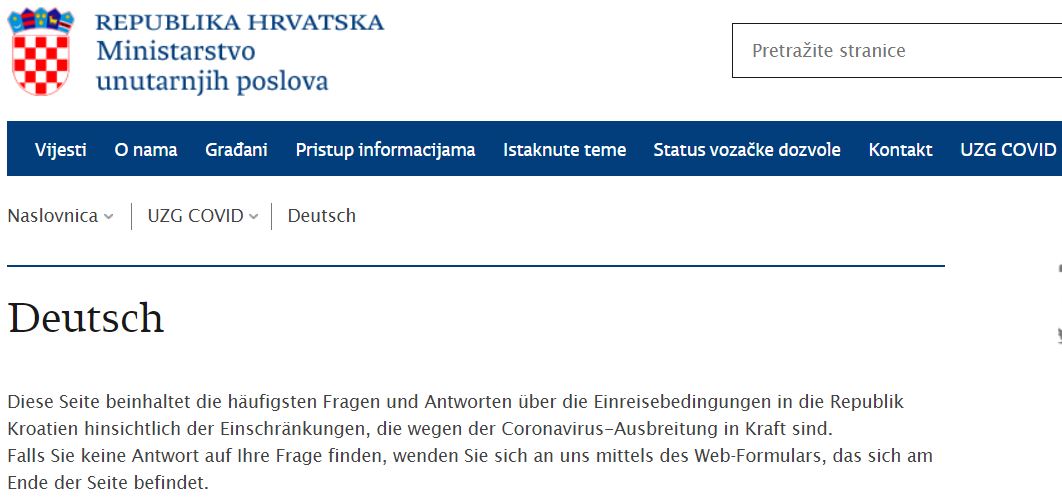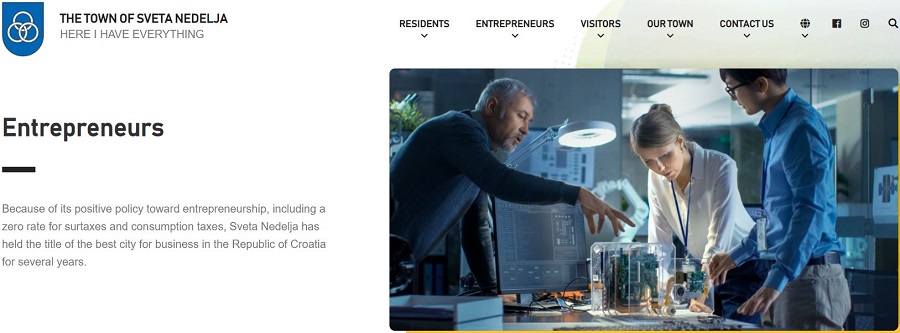Opening a Croatian Business Bank Account as a Foreigner... in 46 Minutes.
February 23, 2021 - After being told it would take weeks by another bank, opening a Croatian business bank account in 46 minutes as a foreigner IS possible.
I ALMOST had the perfect day with Croatian bureaucracy last week.
The mission was daunting. First stop, Raiffeisen Bank in Varazdin to sign a leasing contract for my new (not so new) car. Then to the notary to notarise the contract, which I then had to return. Then off to the heroes at FINA to collect the documentation for my new jdoo company. then on to my bank PBZ - where I have had a private and a Croatian business bank account for 18 years. My simple mission was to open a bank account for the new company, return a document to my FINA heroes, then pick up some chicken from the market, and there would be curry for lunch. You can see how I did in 'Beer to Go' to Celebrate a Morning with Croatian Bureaucracy.
As a spoiler alert, I didn't manage to open the bank account. I was shocked to be told that as a foreigner (they did not ask my nationality), opening a Croatian business bank account in Varazdin was not possible. I would have to travel to Zagreb for this. Crazy, I thought to myself, as I headed to the market, the chicken curry now guaranteed. But not too inconvenient, as I would be in Zagreb two days later.
My wife called ahead to make sure it was possible and to make an appointment. It was indeed possible to make an appointment, but the earliest available slot was on March 3, some two weeks ago.
Let me get this right. Opening a Croatian business bank account as a foreigner (the PBZ rules are apparently different for locals) meant I would have to drive 160 km round trip and wait two weeks for the privilege?
In 2021?
My long-suffering accountant, Gordana, confirmed that this was indeed the case after she called the bank to check. A recent change of policy, apparently.
This is nuts, I thought. So I posted on Facebook and LinkedIn, with a challenge to anyone working in the industry. Was opening a Croatian business bank account as a foreigner possible in one day? I even offered to write an article on TCN about the process, which I thought would be a good PR incentive.
I was disheartened by the early feedback. Representatives of various Croatian banks were tagged by my social media followers, but none got in touch. And then someone said that I should try Raiffeisen Bank - you could even do most of the application online.
Really?!?
We checked, my wife called, and it seemed to be true. Or I could do it in person, the very helpful Varazdin branch confirmed. I chose the latter. And I decided to time it.
Arriving exactly at 15:00 my soon-to-be new best friend, Nenad, took my papers, passport and ID and inspected them. All was in order. This should not take long, he exclaimed in perfect English.
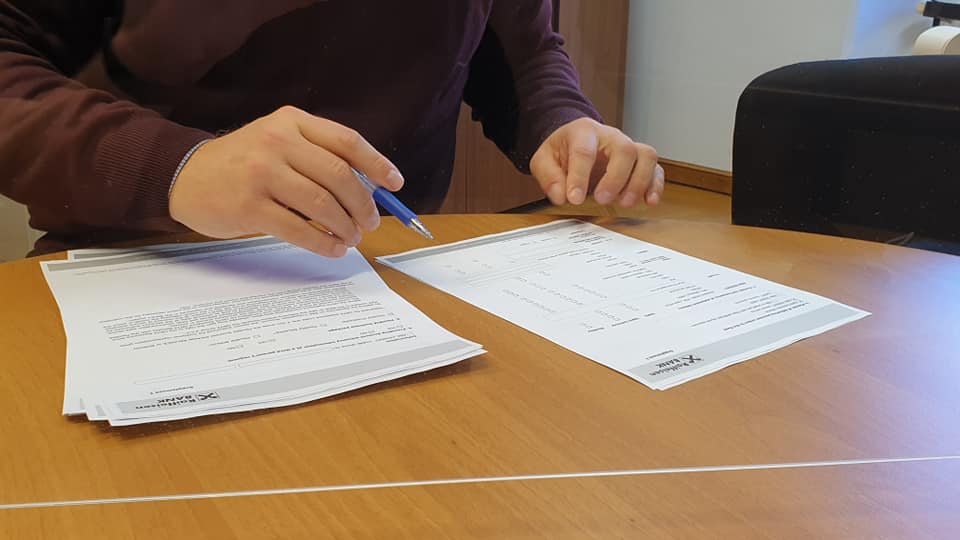
A few questions, a few signatures, and all was done. Could I add my accountant to the account, give her online access and have all the bills sent to her?
Of course, replied Nenad. What is her name, perhaps she is already in our system? And there she was, young Gordana smiling out of Nenad's desktop. We got her on the phone and confirmed some details and all was set up.
Absotulely painless.
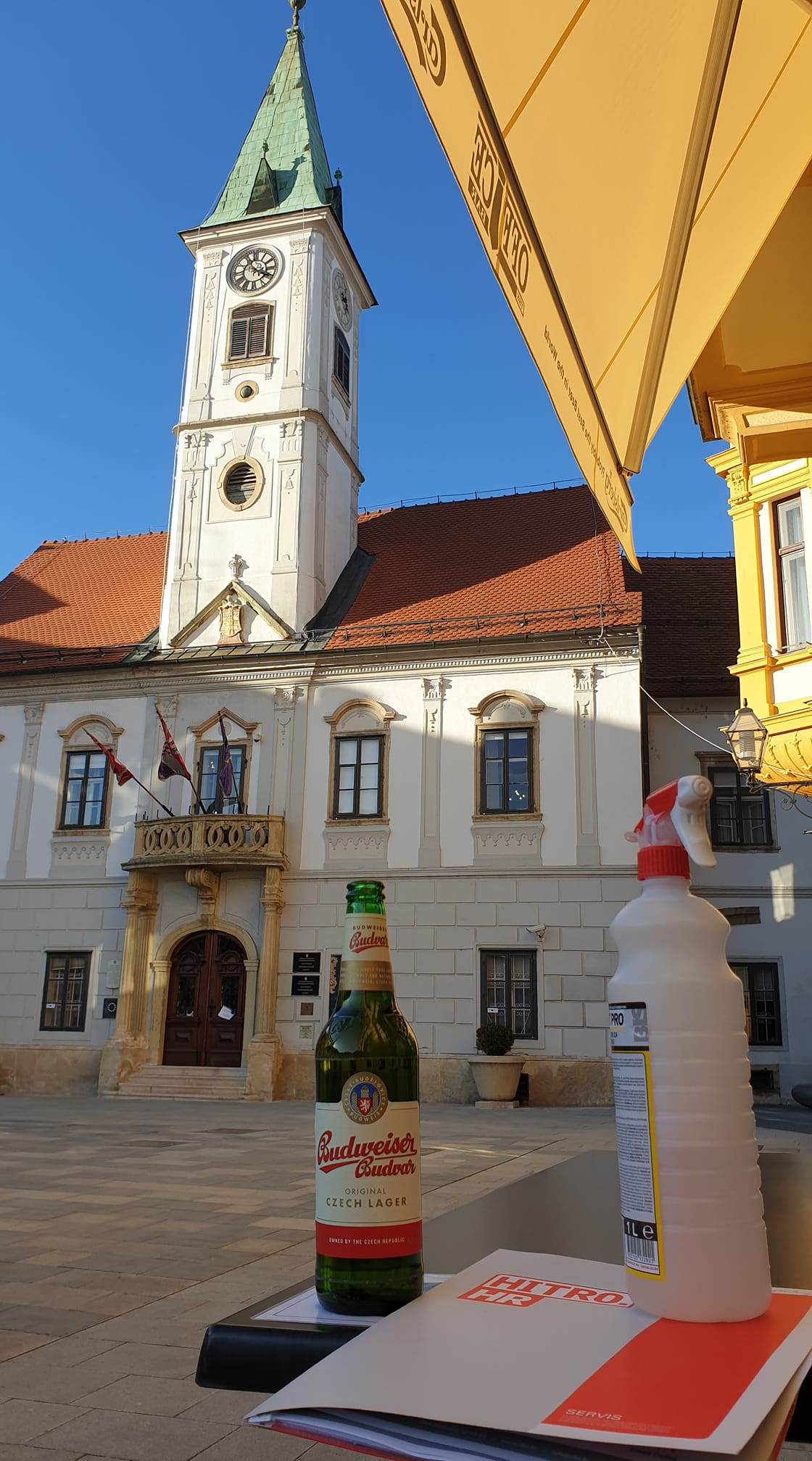
Timeline 46 minutes from start to finish with the opening process, including downloading the application and training on how it works.
Today, I will get the number of the account and the online access codes, and we are ready to roll.
Just 46 minutes in the bank rather than the anticipated hours of torture, leaving plenty of time for the finer things in llfe.
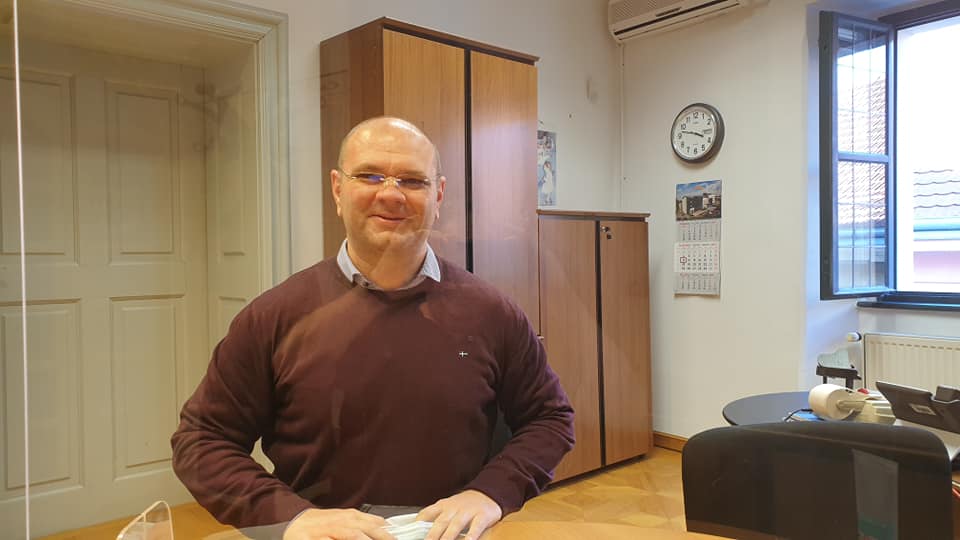
Nenad, I salute you, Sir. A lovely man, for a Liverpool fan. Masked up for the entire process, he did consent to a photo without a mask for this article.
I don't know if Raiffeisen has an initiative for rewarding star employees, but my vote for a gold star and chocolate biscuit goes to this young man.
For more on the joys of Croatian bureaucracy, click here.
'Beer to Go' to Celebrate a Morning with Croatian Bureaucracy
February 20, 2021 - Snapshots of Croatia during the pandemic - a 'beer to go' to recover from a morning with Croatian bureaucracy.
One of the realities of life in Croatia is that you cannot avoid the bureaucracy, no matter how averse you are to paperwork. Admin is something I hate more than anything, and my long-suffering wife has been heroic over the years keep the ship afloat, as I leave important letters unopened, documents unsigned and the like. I would be lost without her.
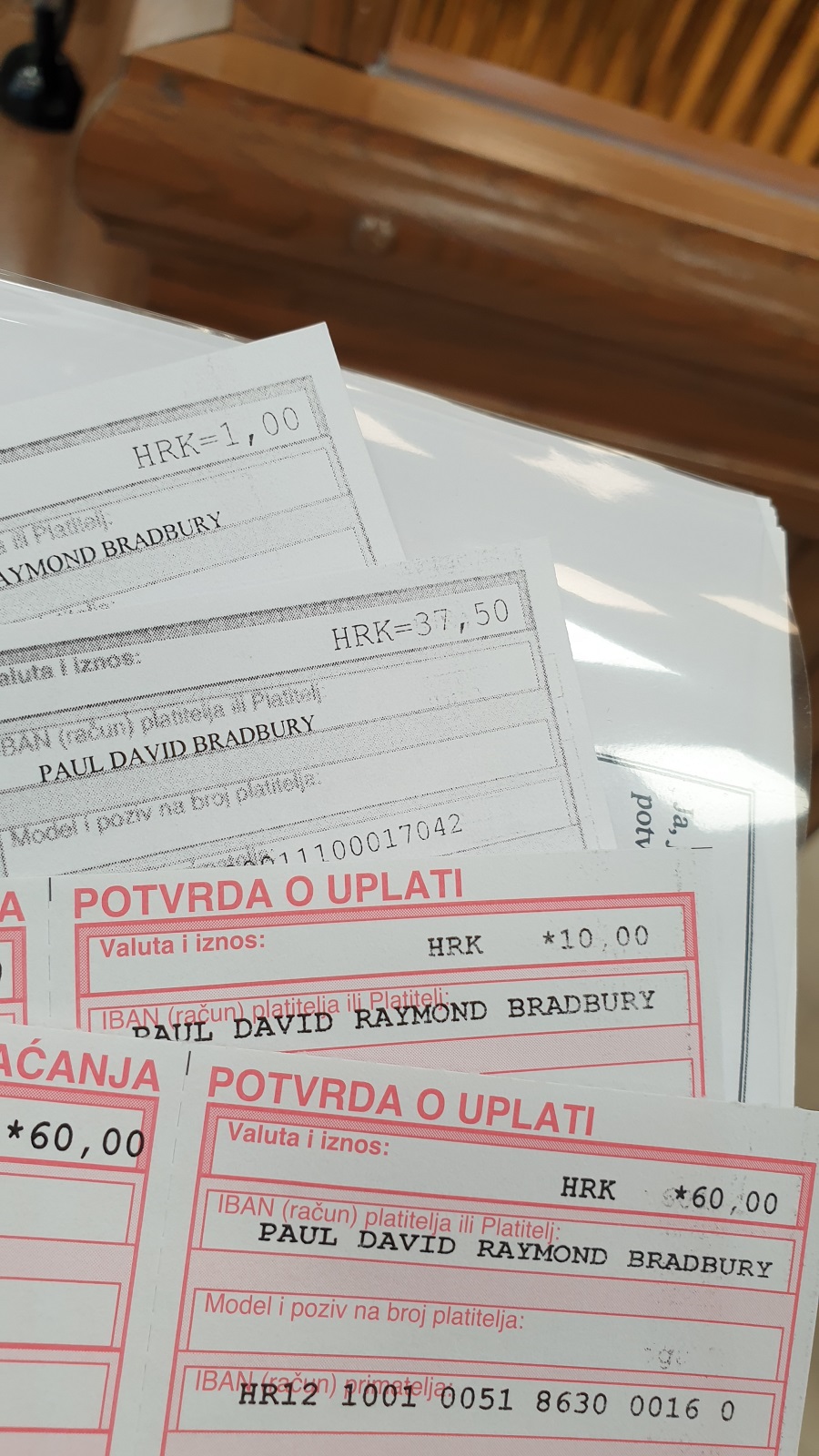
Sometimes, however, I just have to get out there without her help. Dealing with Croatian bureaucracy is always great blogging material, and so it proved last week as I went to open a Croatian company for a new project we have. You can learn more in Croatian Bureaucracy in Action: The Pain Required to Pay 1 Kuna.
This week's bureaucratic challenges looked all the more daunting, and I had allocated what I hoped would just be a morning, but could possibly take all day. Here was my list of tasks on Thursday morning in Varazdin.
1. Visit Bank 1 to finalise a leasing contract for our (not so) new car.
2. Take contract to the public notary to sign and stamp.
3. Return signed contract to Bank 1.
4. Proceed to my heroes at FINA to collect the paperwork for my new company.
5. Visit Bank 2 to open a bank account for my new company.
6. Return to FINA to hand over a document from my new bank account at Bank 2.
7. If I was finished by midday, buy some chicken and veg from the market, asked my wife. Ha, finished by midday - not a chance.
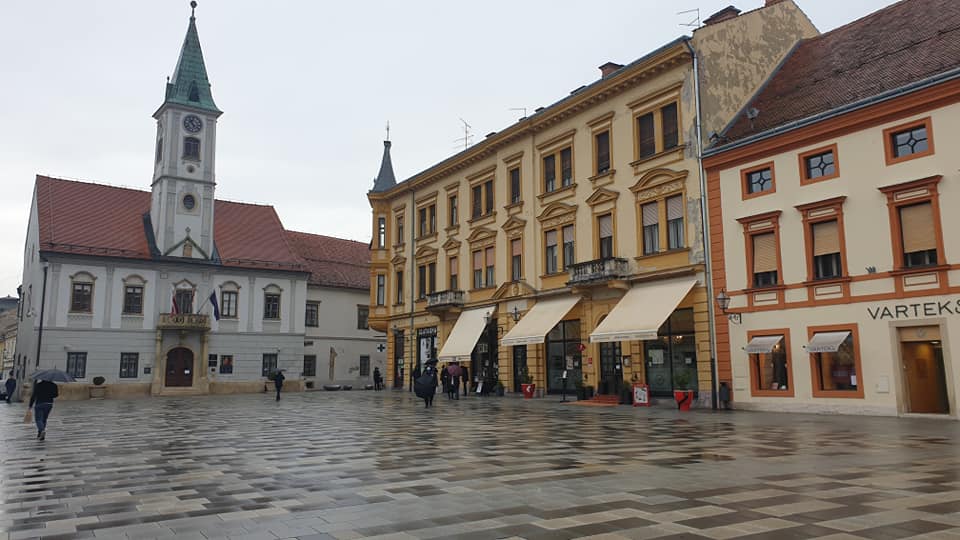
As I criss-crossed the gorgeous old town of Varazdin to my various bureaucratic points of challenge, I felt a little depressed by my normally uplifting surroundings. The bleak weather did not help, but it was the lack of people and cafe tables and chairs.
For we are currently living in the insane world where cafes are closed, but people can buy their drinks and sit on park benches next to the cafes and drink there. In the latest example of the absurdity of life currently in Croatia, cafes were allowed to sell drinks to go from February 15. The fact that they were banned from doing so before, despite places such as bakeries being allowed to, gives an indication of how nuts things are in Croatia at the moment.
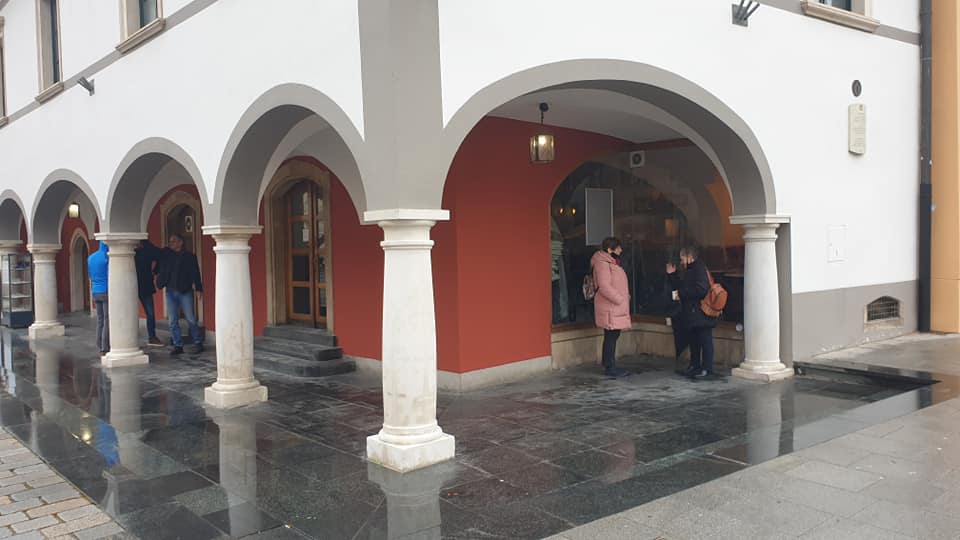
Cafe to go, the reality. A normally popular cafe brimming with life and outside tables and chairs on the main square in Varazdin.
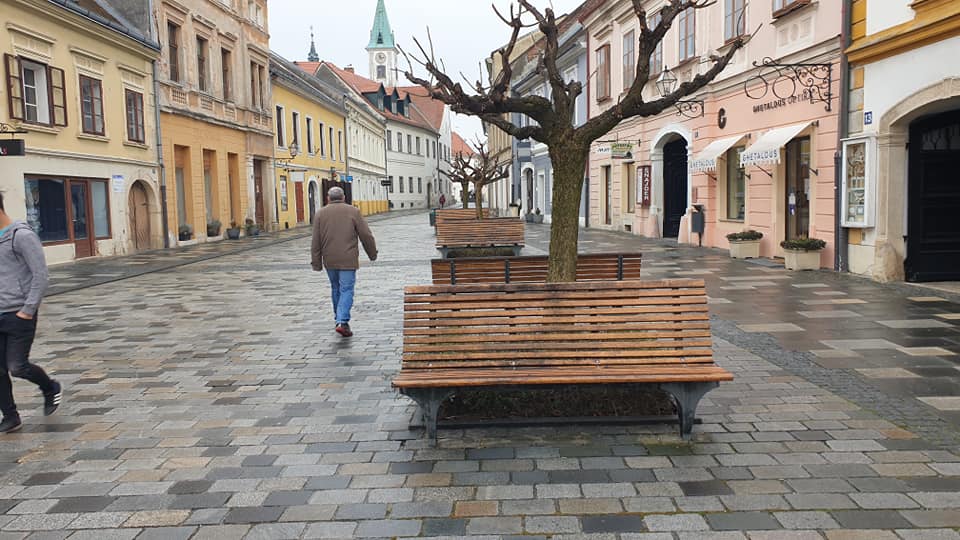
Had the weather been better, there would have been people sitting with their coffee to go here.
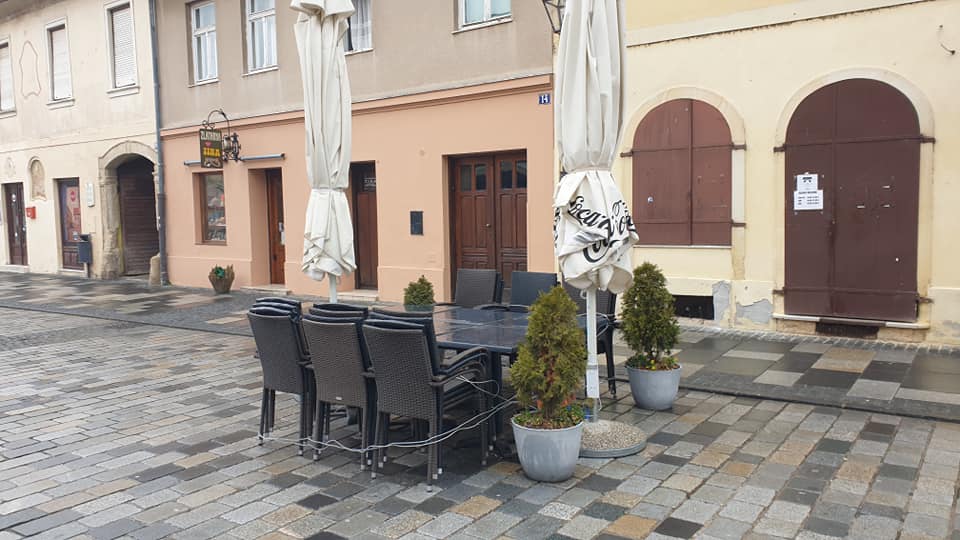
Meanwhile, two metres away...
I digress. Bank 1 was a breeze. The very efficient leasing lady was very organised. All was ready, and she asked me to check the details, presented me with a folder of documents and sent me on my way to the public notary. The notary welcomed me back like a long-lost friend. There was no queue, and all was going superbly until she noticed that the address did not quite match the one on my ID. Here we go...
But this is Varazdin, not Dalmatia. A phone call, an exchange of email addresses, and the revised contract was printed off by the secretary within 5 minutes. Five minutes later, I was on my way.
croatian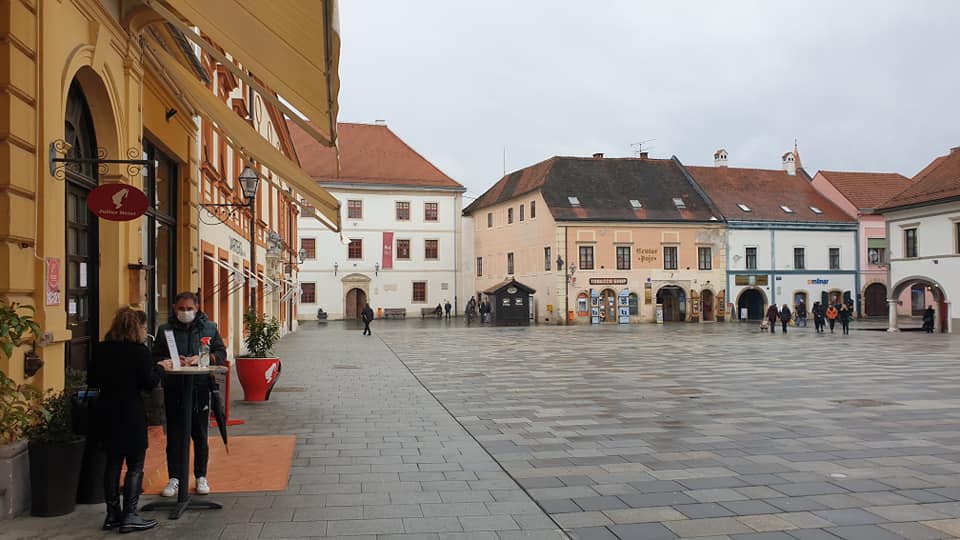
Passing through the gates of Hell into FINA, the very efficient man who processed my application had another neat folder waiting for me. All was ALMOST complete, he assured me. I just had to go and see his colleague and fill out a form, then pop into Bank 2 to open the account and return him a document from Bank 2.
The kolegica looked at me and handed me a form with some rapid-fire instructions. This was the 'make or break' moment for me. If I caved, I would have to figure out how to fill in the form on my own and would probably get it wrong. If she did it, I could be on my way and on course for the market shopping. The prospect of a spicy chicken curry for lunch hung in the balance.
Pressing the form towards me, she clearly wanted me to get out of the way so she could deal with the next person. I employed my most effective defence against such situations when dealing with Croatian bureaucracy. I gave her the 'I am a helpless foreigner who doesn't really understand the language and is crap at filling out forms, but I will stand here and look pathetic until you help me' look.
It worked.
"Give me the form and your ID."
Five minutes later I was on my way, destination Bank 2. Time on the clock - 37 minutes taken so far. I was literally flying. Bank 2 was my bank, I have been with them for 17 years, both my personal and company accounts. This would be over in minutes, the chicken bought, and curry was assured.
"Sorry, you are a foreigner, you cannot open a business account here in Varazdin. You have to do it in our branch in Zagreb."
What?!?
There was no arguing with the lady, rules where rules. My accountant checked with the bank and they have just changed the rules, so the information I was given was correct. I made an appointment with the bank in Zagreb. The next available appointment is on March 3, some 2 weeks away. In a different city.
Croatian banking service in the 21st century.
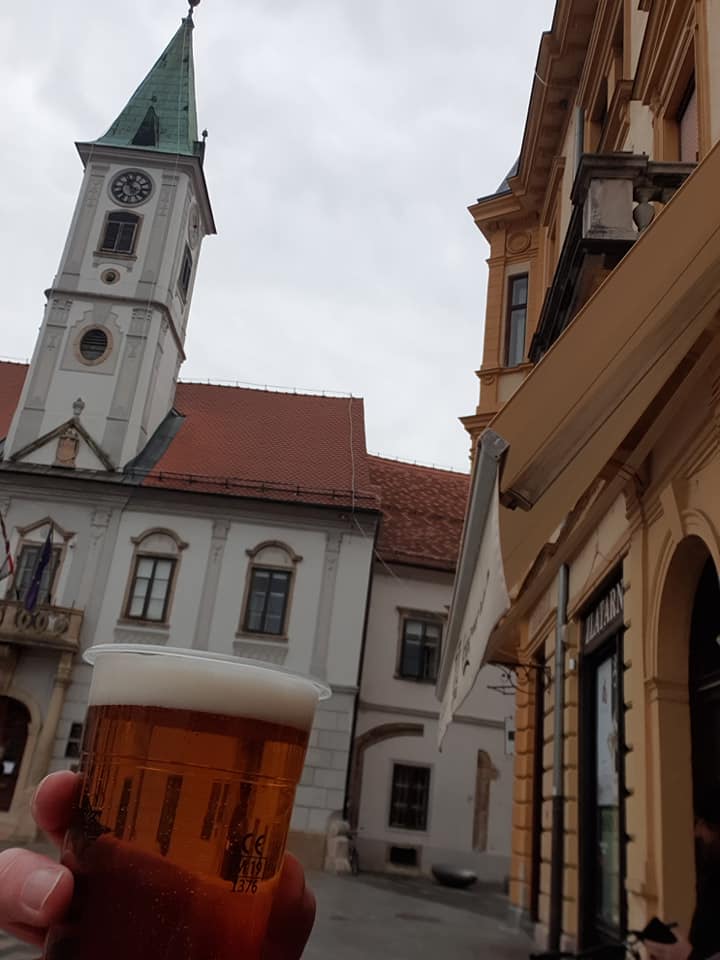
Every cloud has a silver lining. With no account to open and no document to return to FINA, the market chicken and veg were mine, and there was plenty of time to stop for a 'beer to go.' So unaccustomed was I to the realities of cafe life in 2021 in Croatia, the option of stopping off for a cold one did not occur to me.
So there I was, almost alone on the main square, 16 kuna poorer after swapping my cash for a cold one in a plastic glass and just standing there with no tables or chairs around me.
A mildly successful day, all things considered. A little like the chicken and egg conundrum, I wonder what will come first - this foreigner being able to open a bank account or cafes finally opening to end all this madness. To be clear it is the inconsistency that I am referring to when talking about madness. As you can read in our last editorial - As Gym Owner Faces Prison, the Virus Must be Laughing at Croatia's Inconsistent Measures.
Slavonia v Montenegro, Split-Dalmatia v Malta: Comparing Croatian Bureaucracy
November 22, 2020 - Viktor Simunic, an enterprising independent young councillor in Zagorje has been comparing Croatian bureaucracy with countries of a similar size. Houston, we have a problem.
I don't think I am divulging any State secrets when I write that Croatia has a very bloated bureaucracy. In an age of economic downturn and belt-tightening, savings in bureaucratic efficiency would be an obvious place to start. Indeed, this excellent recent big data analysis a few months ago showed how Croatia could save 1.29 billion kuna (170 million euro) a year simply by merging municipalities. A move that would also improve efficiency.
A move that will almost certainly not happen because... well, this is Croatia.
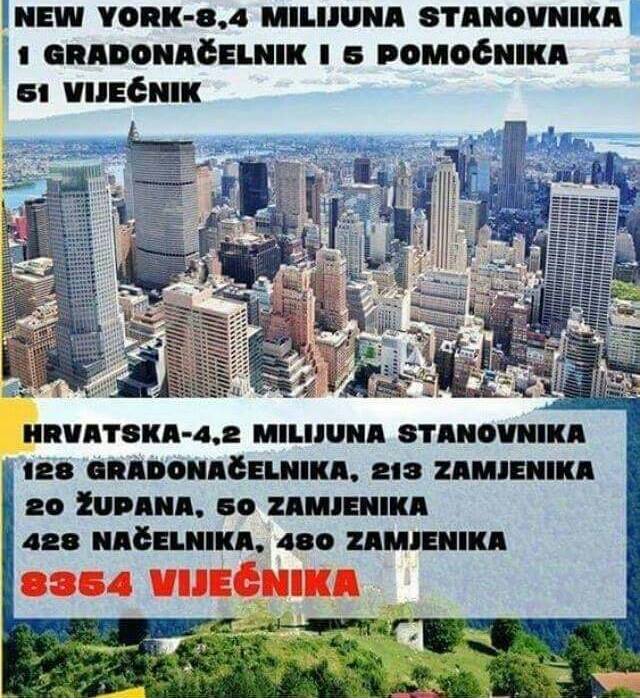
A popular comparison to explain the absurdity of Croatia's bureaucratic overreach and jobs for the cousins - and one I have used before - is comparing the number of people it takes to run New York City, which is twice the size of Croatia. Obviously, running a big city and a country are very different, but what takes 51 city councillors in New York to look after the needs of a population twice the size of Croatia - a task left to a heroic 8,354 councillors in Croatia.
And while the picture above makes a point, it is obviously not a true comparison of like versus like, which is why I found the analysis I came across today to be rather interesting. I have never come across Viktor Simunic before, but his Facebook profile states that he was born in 1991 (thereby answering the all-important 'Di Si Bio u 1991?' question), was the youngest mayoral candidate in Krapinsko- Zagorje County, and is currently an independent town councillor in Oroslavje. And he has been busy researching and coming up with data comparing Croatian bureaucracy with different places.
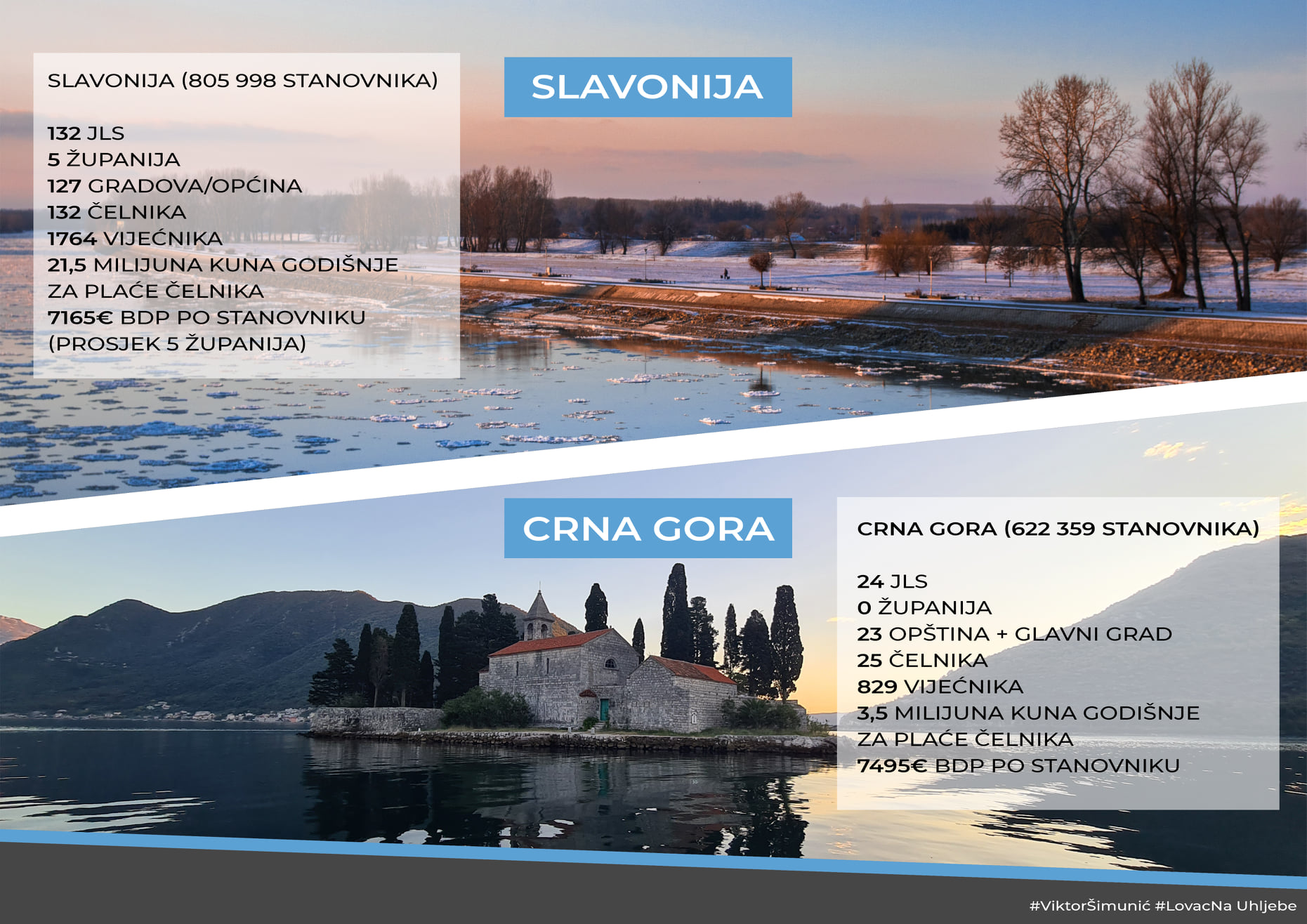
When I first learned the extent of Croatia's bureaucracy, I assumed that it was an ex-Yugoslav thing (which it is in part), except that it seems that Croatia rapidly expanded its bureaucracy after independence, and it is now much more bureaucratic than its neighbours and former fellow republics.
Simunic has been doing a little research comparing Croatian bureaucracy to other places, then posting his findings on Facebook. His latest was a look at the number of people it takes to run Slavonia compared to Montenegro, which he visited recently at his own cost in order to gather the information. Slavonia's official population of 805,988 has been sharply reduced since the 2011 census, with estimates that the current number is closer to 700,000, a little more than the whole population of Montenegro.
Administratively, it is in a different hemisphere, with a total of 132 local self-government units (compared to 24 in Montenegro), 5 counties, 132 local leaders and 1,764 councillors (compared to 25 local leaders in Montenegro, and 829 councillors). The annual cost of paying the Slavonian administration is a cool 21.5 million kuna a year, compared to just 3.5 million kuna in Montenegro.
Quite a potential saving.
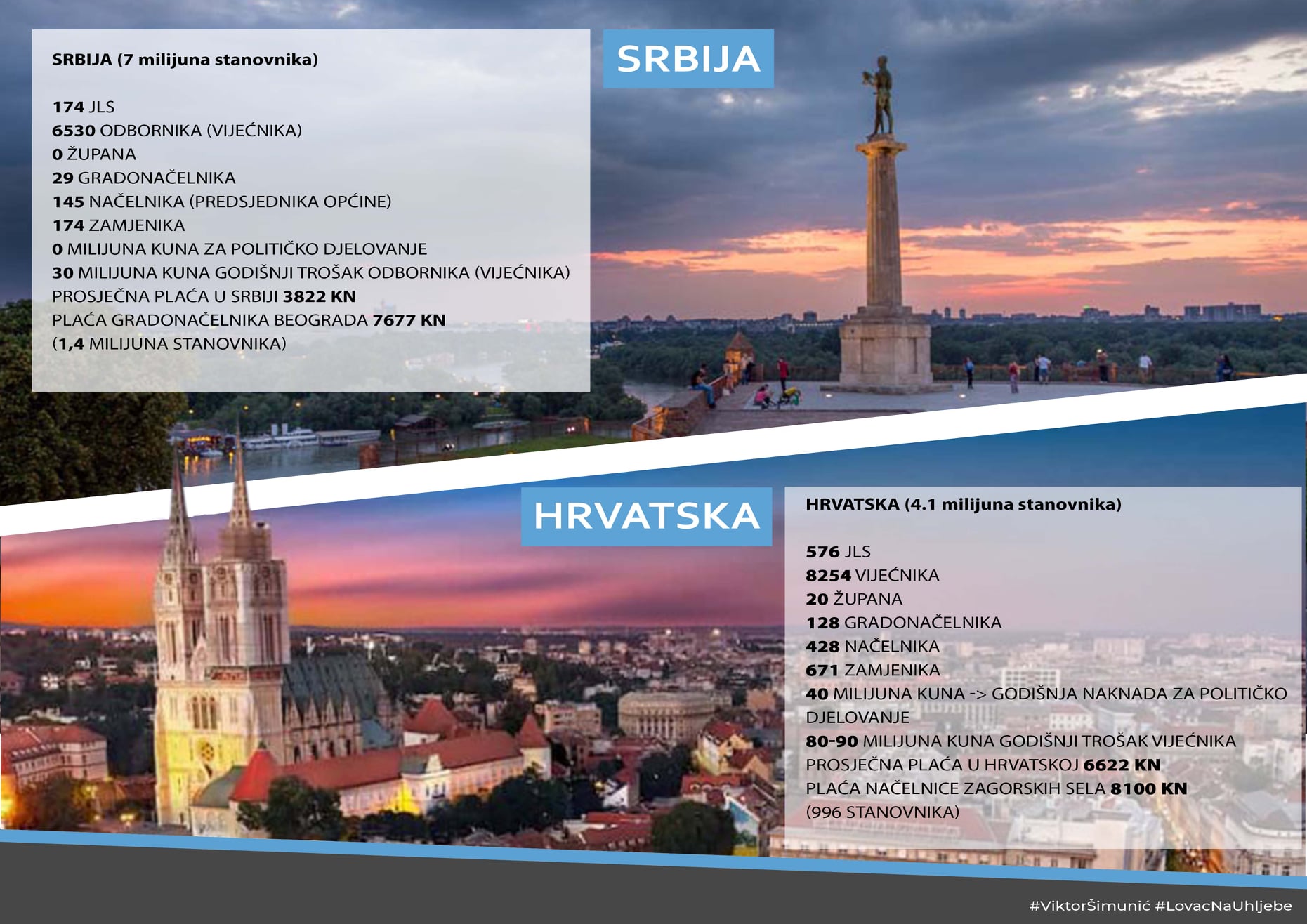
Another former Yugoslav republic, and a larger one - Serbia - appears to be much more efficient in administering its 7 million inhabitants, with just 174 local self-administration units compared to Croatia's 576. Salaries in Serbia are lower than Croatia in general, but who would have expected that the average salary of a mayor of a village in Zagorje (average population 996) would be less than the Mayor of Belgrade, population 1.4 million?
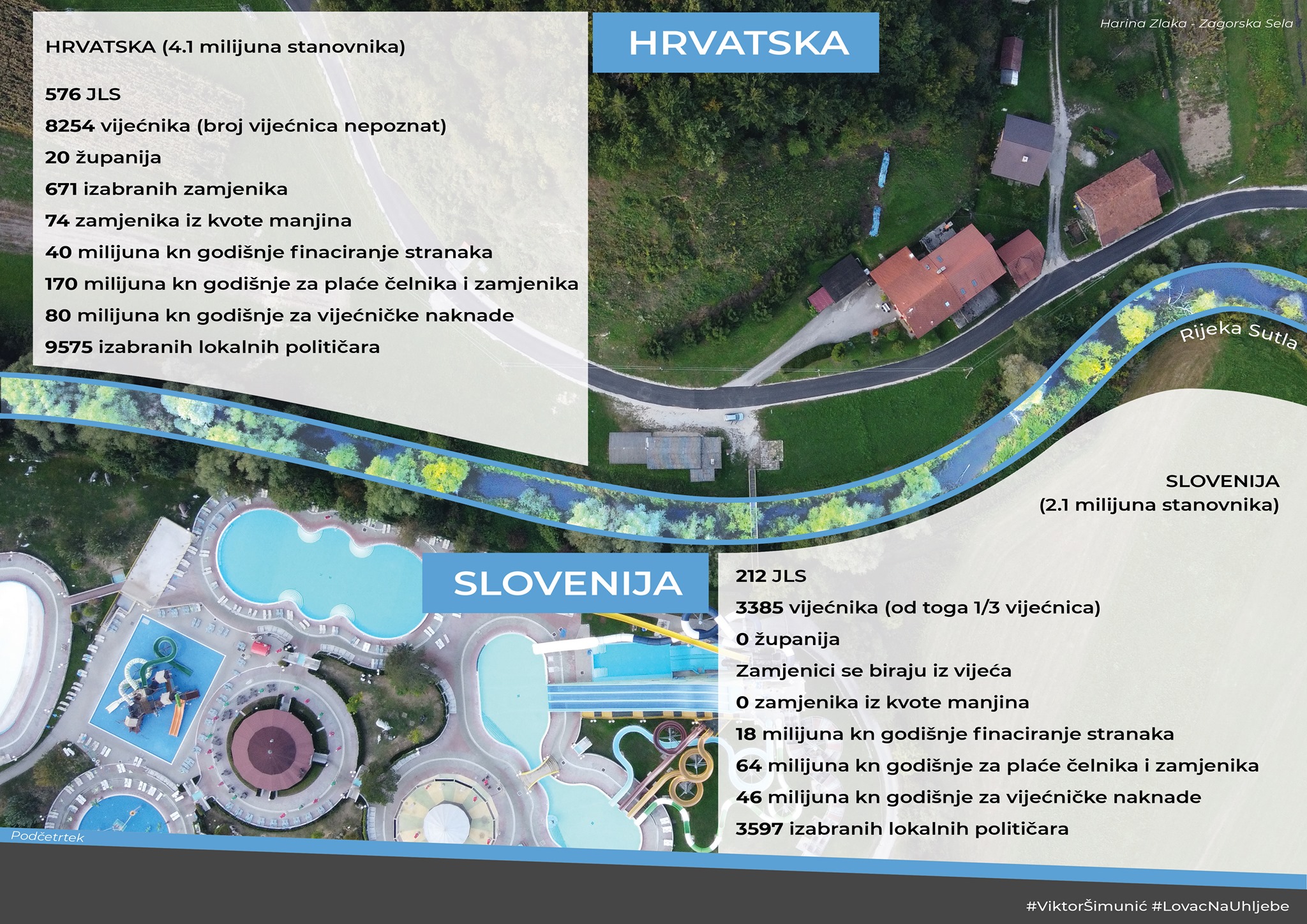
Slovenian is another former-Yugoslav republic, which is about half the population of Croatia and with higher salaries. Administratively it needs much less than that half to run the local administrations, both in terms of money spent and political representatives.
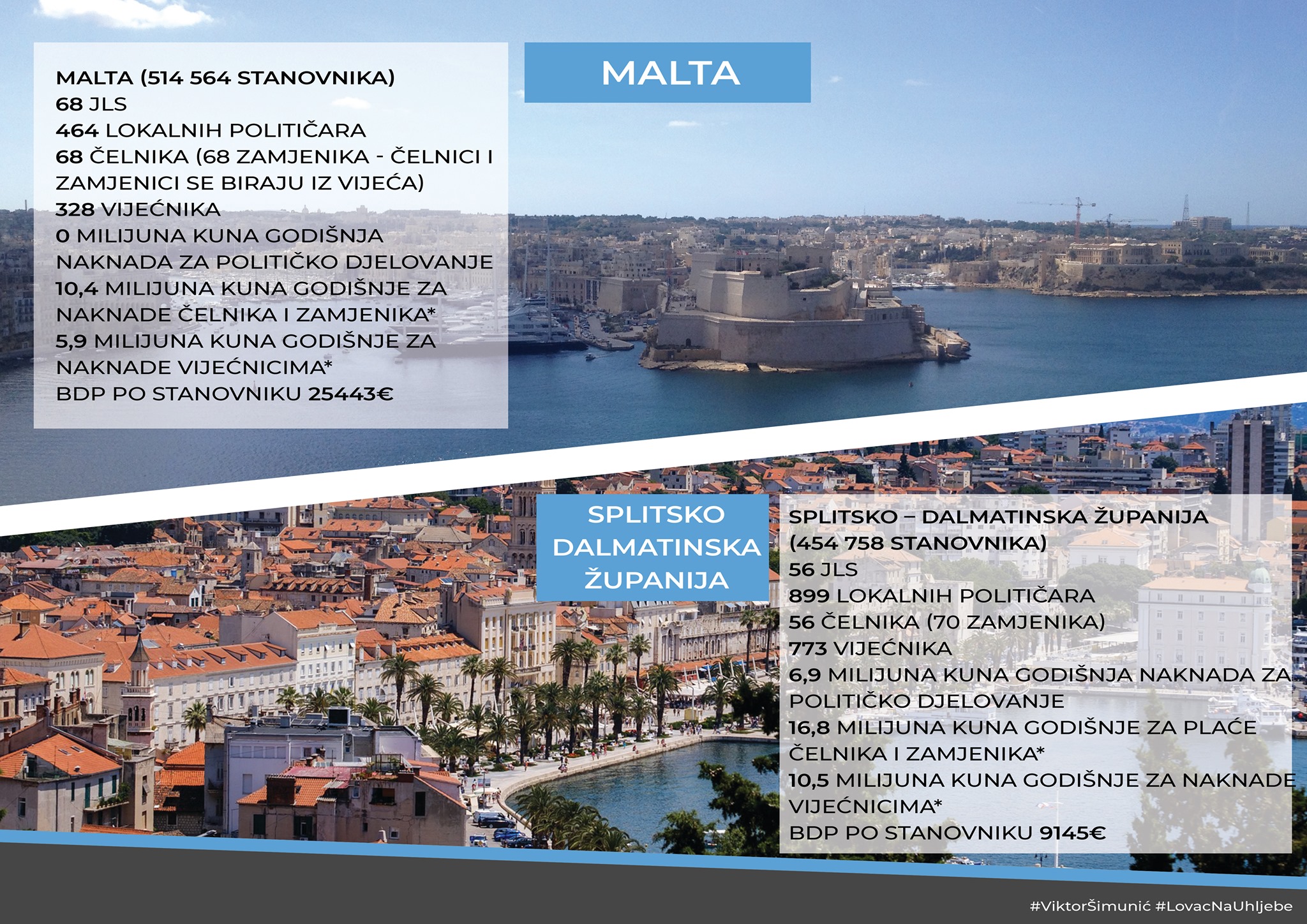
Simunic also made did some research comparing Croatian bureaucracy with other parts of Europe. The populations of Malta and Split-Dalmatia County are quite similar, Malta being slightly larger. While Malta has slightly more local self-government units (68 v 56), it needs considerably less paid help to run them 860 officials at an annual cost of 16.3 million kuna, compared to Split-Dalmatia County's 1,728 officials which cost 34.2 million kuna.
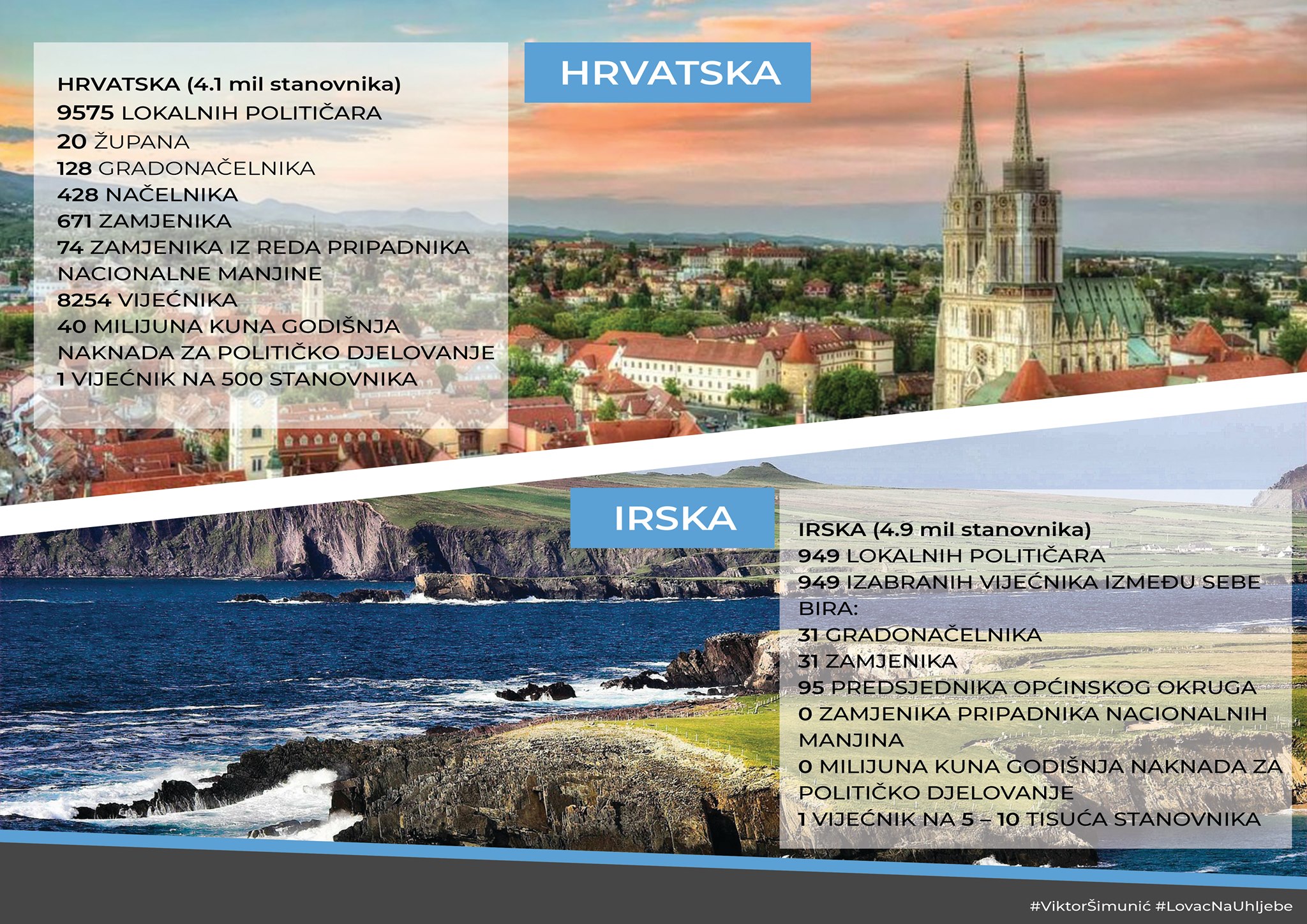
Is the grass greener in Ireland, as so many Croatians who emigrated there hoped it would be? It would seem that - at least administratively - it is. Just 2,057 local politicians required to look after the 4.9 million inhabitants, compared to 9,575 in Croatia.
Or, to put it a little clearer, one councillor per 5-10,000 inhabtiants, compared to the Croatian ratio of just 1 - 500.
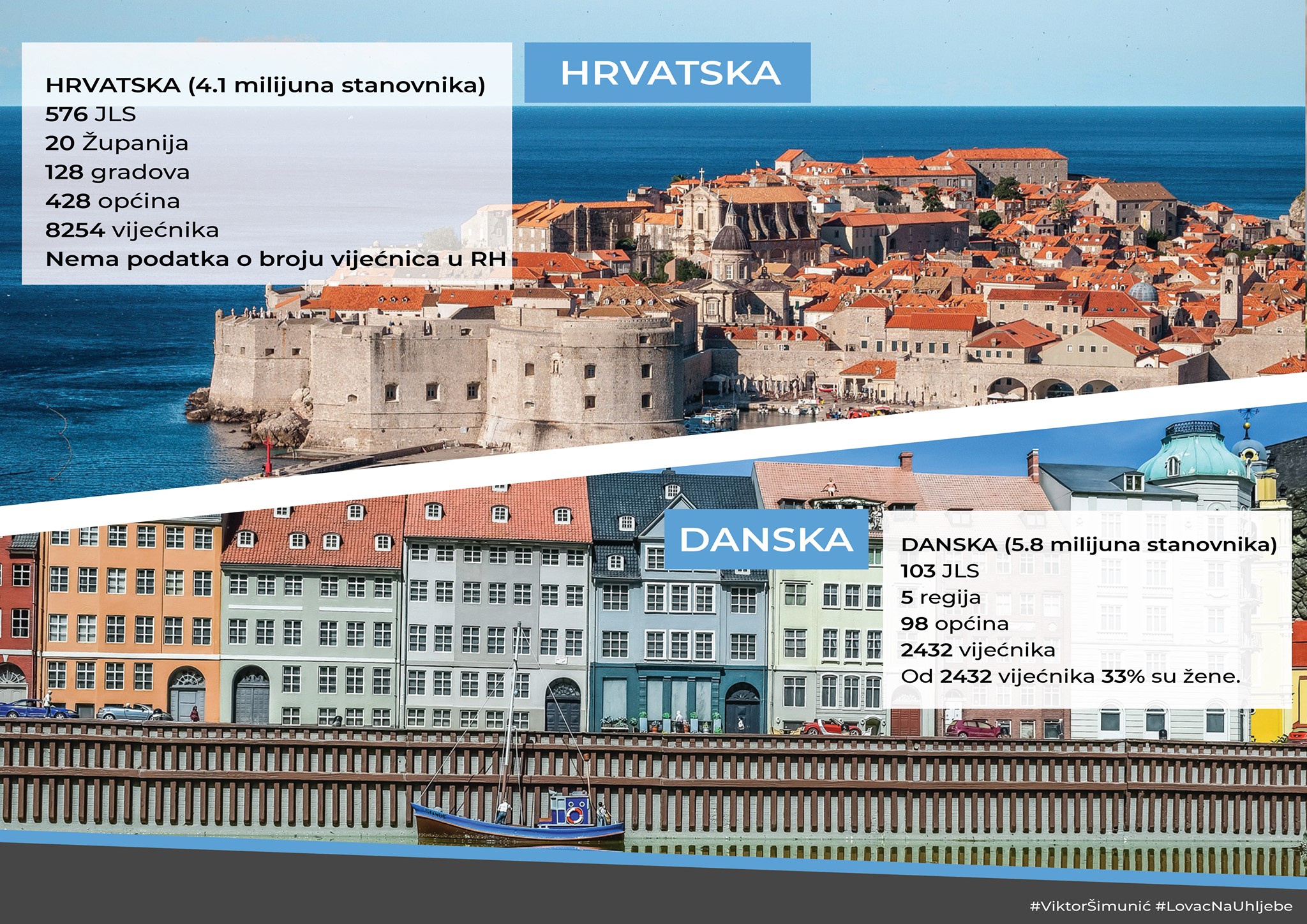
And the final model to compare for now - Denmark, with a larger population of 5.8 million. Just 5 regions, 103 local self-administration units, 98 municipalities, and 2,432 councillors, of which 33% are women.
Winter is coming, as are the cutbacks. Will common sense prevail in The Beautiful Croatia? Some easy and sensible savings from a bloated and inefficient bureaucracy, already costed out in the report above? In a country where there are 319 local tourist boards but nobody available to answer tourist emails, don't bet on it.
You can follow the research of Viktor Simunic on Facebook.
Official Croatian Websites: Who is Really Engaging with the World?
September 30, 2020 - The user experience of official Croatian websites for non-Croatian speakers can be very frustrating. So who is taking its foreign visitors seriously?
One of the realities about being a blogger in Croatia and writing for TCN is that I have spent far more time than is healthy over the last decade on official Croatian websites in search of information that simply was not available in English - and often, even in Croatian.
Official Croatian websites are an interesting sub-species, and in many ways they give a great insight into the mentality and mindset of the authority that they represent. A mindset which - albeit it very slowly - is beginning to change.
I have lost count of the number of local tourist boards, for example, whose websites exist only in Croatian. Never mind that the point of the website is to provide information to the end-user - the non-Croatian-speaking tourist. Providing an English version is above and beyond the call of duty. Some official websites do have an English version, which once uploaded, is then never updated. A website has been created - tick. An English version (usually much smaller) has been created - tick. And then things are forgotten. Never mind the needs of the end-user. Things then stay the same for years, so much so in fact that ministries can even enter 2020 with the fax machine as their main tool of communication.
I heard a story earlier this year about Mate Rimac and the Rimac Automobili website, which to this day is in English only. When the site first went live, the story goes, Rimac was criticised for not having a Croatian version of the site. The alleged reply is that his market was the world, not the 4 million people living in Croatia - he was engaging with his desired audience.
This is something that has been missing (and continues to this day) in most of the approaches of official Croatian websites, where the relevant authorities seem to have a mindset that a website is less an effective tool of communication with its audience, and rather a chore to be completed to tick off the box.
Things are changing, albeit very slowly, and if you look hard, you can see some seeds of mindset change taking place, even in places where you might not suspect it.
With all my dealings with official Croatian websites this year, the clear winner for me - and this may surprise people - is without question MUP and the Croatian Border Police for their excellent handling of the corona crisis.
In addition to the 21.7 years of waiting that the Enter Croatia form - available in 11 languages - saved at Croatia's borders in the first three months, MUP produced a comprehensive information section on all you needed to know, with regularly updated FAQs. In THREE languages - Croatian, English and German. While the Ministry of Tourism was ordering more fax paper to deal with its incoming faxes, MUP was providing a service-oriented approach directly meeting the needs of its end users. If there is an award for official communication during the corona crisis, I sincerely hope that MUP wins it. Having been heavily involved in the information flow since February, I cannot overexaggerate the outstanding role they played.
Of course, one of the benefits of providing what the customer needs online is that you then don't have use resources to provide the same information to users phoning and emailing for the information. By meeting the needs of the end-user on the website, you have more time to deal with your other tasks. In a commercial mindset, that makes complete sense, but much of Croatian officialdom is far away from that mentality and mindset at the moment.
But it is changing.
Last weekend was a real eye-opener for me, as the family and I spent a weekend at arguably Croatia's most progressive town, Sveta Nedelja (coincidentally - or is it? - the home of the Rimac revolution). You can read about our visit to the many successful businesses in the town here, but one of the many things that caught my eye that weekend was the official Sveta Nedelja website. This little town of 20,000 people had what almost no other local authority has in all Croatia - not only a website in no less than three languages (Croatian, English and German), but also one which is filled with user-friendly advice which not only informs but also gives the impression that it wants you to visit, to invest. As the town's English slogan suggests - Here I Have Everything.
A local authority which is engaging with its end user.
Sveta Nedelja is actively courting new business with its transparent administration and tax incentives. The Rimac factor is an obvious pull, as is its superb position just off the motorway and a few minutes from both Zagreb and Slovenia, but many other businesses are moving to the town. And the numbers speak for themselves - 20% more jobs created since 2017 during a global downturn, a 10% population increase since the 2011 census, unemployment at just 3.9% compared to the national average of 9%.
The three languages are one thing, but the quality of the information available is another. In the entrepreneur section, for example, there are comprehensive sections in three languages on the benefits for entrepreneurs, the investment process in Sveta Nedelja, information about communal contributions and utility fees, as well as contact information which includes an invitation to the Mayor's Open Door session on Mondays from 13:00 to 16:30.
I have never really spent much time looking at local authority websites in Croatia, but I was now curious to see how the forward-thinking Sveta Nedelja approach compared with some of the bigger cities.
There was no contest.
Zagreb has a limited English section, which has all the hallmarks of ticking a box. Its introduction is As we enter 2020, Zagreb will become the headquarters of the Presidency of the Council of the EU. There is a promising Press section on the navbar, which turns out to have been created back in 2017 and has absolutely zero content in it apart from some contact details.
With the very notable exception of Rijeka (trilingual in English, Croatian and Italian), none of the other big cities in Croatia have any meaningful foreign language section. Some have created the buttons, but the actual content is minimal to non-existent.
Does any of this matter? Isn't the local authority website primarily for its local residents? Yes, of course it is, but not exclusively. There is more and more foreign interest in the Croatian lifestyle these days, and the introduction of the digital nomad visa will only increase that interest, and some of those will be looking for investment opportunities. But there is another important point here. We live in a global village, with lots of talk of SMART cities and inward investments. The very minimum that a local authority needs to do if they are serious about attracting investment is to make it as easy as possible for any interested parties to get the information they need from Google Search.
We live in a global market, and ticking a box is no longer sufficent if we want to compete. And if we do want to compete, success is possible.
Just ask Sveta Nedelja.
Parliament Passes 61 Laws to Streamline State Administration
ZAGREB, October 2, 2019 - The Croatian parliament on Wednesday passed a set of 61 laws to streamline state administration, under which state administration offices would be abolished and their duties taken over by counties.
The laws were aligned with the State Administration Act which provides for all state administration offices, except the administrative and sports inspectorates, to be abolished and their duties assigned to counties.
Counties will thus be put in charge of about 200 additional proceedings, and so far, they had nearly three times fewer. They will also take charge of about 2,000 staff, which will bring their total staff to about 4,200.
Of 2,500 state administration staff, about 500 have opted for severance pay, for which purpose 150 million kuna (20 million euro) will be secured.
A total of 96 assistant ministers will lose the status of government officials and their positions will be filled by heads of directorates for four-year terms.
The Ministry of Administration says that the planned changes will streamline the state administration system and save between 30 million kuna (4.05 million euro) and 40 million kuna (5.4 million euro).
Parliament rejected an amendment put forward by the Social Democratic Party (SDP), under which members of the European Parliament and the European Commission would have been included among office holders subject to the Conflict of Interest Prevention Act.
SDP lawmakers used the amendment to again raise the issue of the property holdings of the Croatian candidate for European Commission Vice-President, Dubravka Šuica of the Croatian Democratic Union (HDZ). The ensuing debate escalated into personal accusations and insults being exchanged between SDP and HDZ deputies.
Branko Bačić (HDZ) said that the government remained open to the SDP's proposal, saying that Šuica's declaration of assets had been made public while she had held office in Croatia and that there had never been any issues at that time.
More politics news can be found in the dedicated section.
Public Administration Minister Nominee Pledges to Cut Red Tape!
ZAGREB, July 13, 2019 - The candidate for the Public Administration Minister, Ivan Malenica, has said in an interview with the Vecernji List daily newspaper that if he becomes the minister, he will work on cutting the bureaucracy because the public administration is meant to be at the service of citizens.
The 34-year-old Malenica, who is the Dean of Šibenik Polytechnic,says that he will hold talks with his predecessor, Lovro Kuščević, on the ongoing projects in the ministry.
There are many things which the Public Administration Ministry has been working on, Malenica said in the interview published on Saturday.
In this context he points out the ministry's work on the legislation regulating institutions, agencies and public administration digitisation.
"Those are important things. There are also the bills on referendum and on prevention of conflict of interest," the nominee said adding that he will have to get an insight into the processes of the preparation of those bills and other things this summer so that he can start dealing with the issues in the autumn, in the event of his appointment.
He says that he will work on eliminating unnecessary red tape and on facilitating doing business in Croatia and making communication between citizens and public administration easier.
Asked whether all that could be done until the end of the current term of the Andrej Plenković cabinet, the ministerial nominee answered that there was enough time.
This past Thursday, Prime Minister Plenković announced his decision to nominate Malenica as the new Public Administration Minister after Kuščević resigned following media reports about his alleged involvement in questionable land and real estate deals. Kuščević has denied any wrongdoing.
Plenković introduced Malenica as a young man, a lawyer, who is well versed in issues relating to public administration.
Ivan Malenica was born in Šibenik in 1985. He graduated from the Faculty of Law in Split, and in 2013 he enrolled in the Public Law and Administration postgraduate doctoral program at the Faculty of Law in Zagreb. He has held the post of Dean at Šibenik Polytechnic since October 2017.
His professional interests include public administration and administrative law.
More news about administration ministry can be found in the Politics section.
Counties to Take Over More Administrative Duties
ZAGREB, April 17, 2019 - Administration Minister Lovro Kuščević on Wednesday met with county prefects and discussed reform measures under which state administration tasks would be transferred to counties as of 1 January 2020.
Kuščević that he has three goals during his term in office - better state administration, decentralisation and digitisation. He added that the State Administration Act will help achieve two of the goals, raising the efficiency of state administration and decentralisation.
Asked about downsizing of state administration, Kuščević said that today there are about 2,500 public servants working in state administration and about 2,000 working in county administration, where he said more will be hired. He, however, added that following the principle of rationality they will try to ensure that as few staff as possible are transferred to counties.
"In cooperation with the Finance Ministry, we have prepared a redundancy programme and expect about 500 to 600 public servants to take advantage of severance packages, which means counties will have that many fewer staff. In the end that calculation will be negligible for the state budget and costs will remain at the present level," the minister said.
This meeting was held with a view to preparing the counties for technical matters so that the system is up and running by 1 January 2020, Kuščević said.
"The agreement that the government will reach with the counties will secure funds for wages for the staff transferring to the counties. They won't be ensured funds for additional hiring and would have to pay any additional staff from their own budgets," Kuščević explained.
More news about administrative system can be found in the Politics section.
Officials Miss Leasing Deadline, Pay 150,000 Kuna for Rent-a-Car Services
Regional Development Minister Gabrijel Žalac’s mother is not the only wife driving a rent-a-car. Certain parliamentary and government officials will be driven in them for at least the next two months. The tax-payers will pay for this a monthly amount of 73,500 kuna with VAT included, i.e. 147,000 kuna, for the total of 14 rented vehicles. Out of this, the total monthly cost for the Parliament is 38,750 kuna per month, while the Office for General Affairs of the Parliament and Government (UZOP) will pay 35,000 kuna, reports 24sata.hr on April 8, 2019.
A five-year operational lease agreement for 20 cars purchased in 2014 expired in mid-March, so the UZOP had to return them to the leasing companies. The Central State Bureau for Public Procurement has concluded a framework agreement for the 18 new cars to be delivered. “But, in order to avoid the situation that we have no vehicles available, we have hired vehicles for the transportation of officials, civil servants and dignitaries," reported the UZOP.
For the purposes of transportation of deputy speakers of the Croatian Parliament, rent-a-car companies delivered to Parliament four Opel Insignias, as well as two Mercedes E Class vehicles to transport foreign delegations. A monthly rental of one Opel Insignia costs 5,000 kuna without VAT, or 6,250 kuna with the tax included. The rental of a Mercedes E Class on a monthly basis is 5,500 kuna without VAT or 6,875 kuna with the tax.
For the purposes of transportation of civil servants and other officials of parliament, government and government offices, eight 2014 Opel Insignia have also been rented. For each of them, the monthly rent without VAT amounts to 3,500 kuna.
“Since vehicles have been leased until the delivery of new vehicles, for a maximum of two months, there was no need to conduct a public procurement procedure. The parliament and the UZOP obtained them per the internal instructions on how to conduct a simple procurement procedure,” said the General Affairs Office.
This all means that someone has missed the deadlines for car purchase by two months. And that someone should be held responsible since the deadlines for announcing public procurement procedures have not been respected. If they had done all these things in a timely manner, there would have been no additional government spending, says a source.
Translated from 24sata.hr (reported by Snježana Krnetić).
More “uhljeb” news can be found in the Politics section.
Croatia without Open Access to Data on Functioning of Public Authorities
ZAGREB, March 1, 2019 - Croatian citizens are still denied access to data on the functioning of public authorities, registers of beneficial owners of the media or judges' declarations of assets, the Open Data Day conference was told in Zagreb on Friday.
The European Commission is working on increasing access to data financed by public funds, but it is not quite clear whether Croatia will follow this trend, primarily because of personal data protection, said the executive director of the non-governmental election-monitoring organisation GONG, Jelena Berković.
Berković said that access to open data provides basic information about what is going on in the country so that voters can make informed decisions at the ballot box. She said that GONG would like to see the results of various inspections, including food quality inspections and school inspections prompted by peer violence.
She said that in Croatia there is still no open access to registers of development, building and occupancy permits, no searchable register of state assets, or schedules of court hearings.
"We would like to see all loans granted by the Croatian Bank for Reconstruction and Development, the register of lobbyists, how EU money is spent in Croatia, and open data on the funding of candidate for the forthcoming European Parliament elections," Berković said.
During a panel discussion, Melisa Skender of GONG said that the Freedom of Information Act was the main tool in the fight to ensure open access to data from public authorities. "However, practice shows that public authorities often ignore decisions made by the Information Commissioner," she said.
The conference brought together representatives of public authorities, the Information Commissioner's Office, the State Election Commission, the Central State Office for Digital Society Development, the Croatian Chamber of Commerce, the European Parliament Office in Zagreb and civil society organisations.
More news on the public administration in Croatia can be found in the Politics section.
Public Administration Minister Says Croatia Working to Downsize Bureaucracy!
ZAGREB, February 14, 2019 - Public Administration Minister Lovro Kuščević on Thursday called well-intentioned the International Monetary Fund's criticism that Croatia should reduce the state administration, saying the government was working on it.
"I agree the state administration and operations should be downsized. However, the government is working on it. Don't forget that we are in the third round of the tax reform, that we have eased the burden on citizens, local and regional self-government units by several billions, that GDP is growing and that the financial growth outlook has also improved," Kuščević told the press.
A journalist remarked that he must admit that no one had the courage to downsize as much as wanted by the IMF, he said it could not be done by saying, "now we'll downsize by 10, 20, 30%."
"The Ministry is working on a stream of projects aimed at downsizing public administration, but these projects must provide the answer as to which administration, how many people, which jobs and who will take them on, and digitisation in itself will result in downsizing," said Kuščević.
A journalist remarked that the IMF said the government should be more ambitious, to which he replied that the criticism was well-intentioned and that the government would analyse them.
The IMF executive directors established that in 2018 Croatia continued its fourth year of positive economic growth as well as its fiscal consolidation albeit at a slower rate, and they also call for improving the country's business climate and rationalisation of the public companies' sectors as well as improvements in bankruptcy legislation.
"The economic expansion continues, driven primarily by private consumption and exports of goods and services," the IMF says in a press release after the conclusion of 2018 Article IV Consultation, on 8 February.
The IMF directors called for more ambitious restructuring of public administration including by reducing high public employment outlays and reducing the fragmentation in sub-national levels of government.
More news on the business climate in Croatia can be found in the Business section.



